Diapers are an essential part of parenthood, but traditional options often raise concerns about harsh chemicals, skin irritation, and environmental impact. Enter natural baby diapers, offering a gentler and more sustainable alternative.
But what exactly are natural baby diapers?
They stand apart from conventional options in several ways:
- Material: Made from plant-based fibers like organic cotton, bamboo, or hemp, minimizing the risk of skin irritation and allergies.
- Chemicals: Free from harsh chemicals, fragrances, dyes, and chlorine bleach, often found in traditional diapers and potentially harmful to sensitive babies.
- Sustainability: Aim for a smaller environmental footprint by using biodegradable materials and reducing waste.
The Future of Natural Diaper Technology: A Glance at What's to Come
The natural baby diaper market is blooming with innovation, and exciting advancements are just around the corner. Here's a peek at what the future holds:
1. Enhanced Biodegradability:
Expect continued progress in developing even more biodegradable and compostable materials for diapers. Imagine diapers that breakdown quickly and safely, leaving minimal environmental impact.
2. Smart Diaper Features:
Imagine diapers that go beyond leak detection, incorporating sensors to monitor baby's health metrics like temperature, hydration, and even potential infections. This could pave the way for personalized care and early intervention.
3. Sustainable Manufacturing:
Look for advancements in sustainable manufacturing practices, minimizing water and energy use and utilizing renewable resources throughout the production process.
4. Advanced Materials:
Research into novel materials like biopolymers and nanofibers could lead to diapers that are even more absorbent, breathable, and comfortable for your little one.
5. Closed-Loop Systems:
Imagine a future where used diapers are collected and processed, their valuable resources extracted and recycled back into new diaper production, creating a truly closed-loop system.
6. Integration with Wearable Technology:
Diapers integrated with wearable technology could provide even more advanced health monitoring and insights, seamlessly connecting to baby care platforms and apps.
7. Personalized Designs and Customization:
Diapers tailored to individual babies' needs and preferences are a possibility. Imagine choosing specific absorbency levels, materials, and even custom prints!
8. Affordability and Accessibility:
As technology advances and production scales up, expect natural diapers to become more affordable and accessible to a wider range of families.
This glimpse into the future is just a starting point. The possibilities for natural diaper technology are vast and ever-evolving. By embracing innovation and sustainability, we can ensure a brighter future for both our babies and the planet.
Different Types of Natural baby Diapers:
1. Cloth Baby Diapers:

Description:
Cloth diapers are reusable diapers made from natural materials like cotton, hemp, or bamboo. They come in various styles and require washing and drying after each use.
Benefits:
- Most environmentally friendly: No waste is generated with each use, unlike disposable diapers.
- More cost-effective in the long run: Although the initial investment is higher, cloth diapers can be used for multiple children, saving money in the long term.
- Gentler on baby's skin: Natural materials are less likely to irritate sensitive skin.
- Greater breathability: Reduces the risk of diaper rash.
Drawbacks:
- Requires more effort: More laundry and preparation involved compared to disposable diapers.
- Bulkier fit: May not be as snug and flexible as disposable diapers.
- Learning curve: Requires learning proper washing and care techniques.
2. Disposable Natural Diapers:
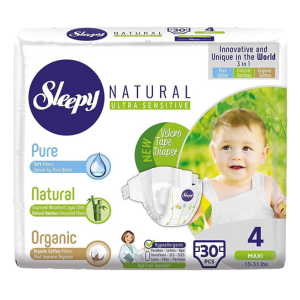
Disposable natural diapers stacked on a shelf
Description:
Disposable diapers made with plant-based materials and free from harsh chemicals, fragrances, and dyes. They offer similar convenience to traditional disposables but aim for a more natural and eco-friendly approach.
Benefits:
- More convenient than cloth diapers: No washing or drying required.
- More comfortable and absorbent than early versions: Offer improved performance comparable to traditional disposable diapers.
- Gentler on baby's skin: Natural materials reduce the risk of irritation.
- Biodegradable options available: Some brands offer diapers that break down more quickly in landfills.
Drawbacks:
- More expensive than traditional disposable diapers: Can be significantly pricier per diaper change.
- Not as eco-friendly as cloth diapers: Still generate waste, although biodegradable options are available.
- Performance may vary: Not all natural disposable diapers offer the same level of absorbency and leak protection as traditional brands.
3. Hybrid Diapers:
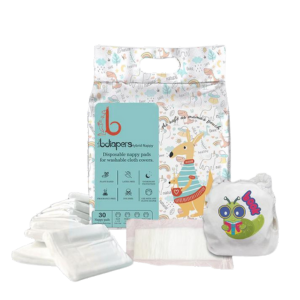
Hybrid diaper with reusable cover and disposable liner
Description:
A combination of cloth and disposable diapers. They typically have a reusable cover made from natural materials and a disposable liner that inserts inside the cover.
Benefits:
- More convenient than cloth diapers: Less frequent washing needed compared to all-cloth diapering.
- More customizable: Allows for adjusting absorbency based on baby's needs.
- Potentially more cost-effective than disposable diapers: Reusable cover reduces overall diaper costs.
- Gentler on baby's skin: Natural materials in the cover are less likely to irritate.
Drawbacks:
- More complex than other options: Requires managing both reusable and disposable components.
- Higher upfront cost: Reusable cover adds to the initial investment.
- Still generates some waste: Disposable liners contribute to landfill waste.
Choosing the right type of natural diaper depends on your individual needs and priorities. Consider factors like convenience, budget, environmental impact, and your baby's skin sensitivity when making your decision.
Popular Natural Baby Diaper Brands and Their Unique Features
The world of natural baby diapers is brimming with innovative brands, each offering unique features and benefits. Here's a peek at some popular choices:
1. Dyper:
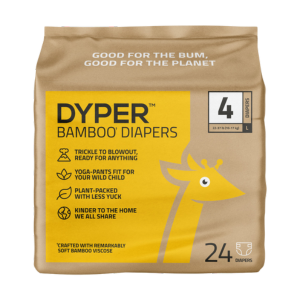
Dyper bamboo diapers
- Claim to fame: Plant-based, super-soft diapers made with bamboo viscose and free from harsh chemicals, fragrances, and dyes.
- Unique features: Super absorbent core with leakproof technology, wetness indicator, and adorable prints designed by artists.
- Target audience: Eco-conscious parents seeking premium performance and adorable designs.
2. Coterie:
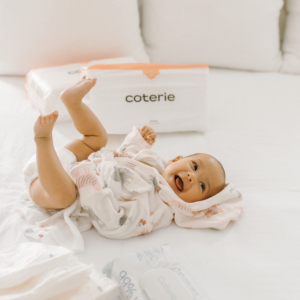
Coterie blush diapers
- Claim to fame: Premium diapers made with certified organic cotton and plant-based materials, offering ultra-softness and breathability.
- Unique features: Hypoallergenic and dermatologist-tested, free from chlorine, latex, and fragrances. Cute and minimalist designs.
- Target audience: Parents prioritizing hypoallergenic materials and minimalist aesthetics.
3. Bambo Nature:
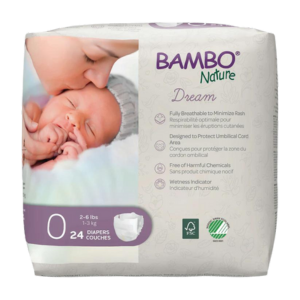
Bambo Nature diapers
- Claim to fame: Sustainable diapers made with FSC-certified bamboo viscose and free from harmful chemicals.
- Unique features: Super absorbent core with wetness indicator, breathable backsheet, and top sheet made with plant-based materials.
- Target audience: Parents seeking a balance between affordability, sustainability, and performance.
4. Hello Bello:
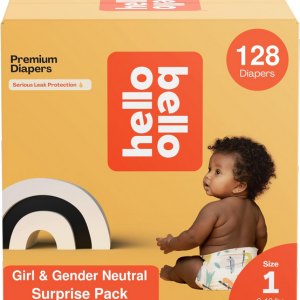
Hello Bello diapers
- Claim to fame: Affordable diapers made with plant-based materials and free from harsh chemicals, chlorine, and fragrances.
- Unique features: Super soft top sheet made with plant-based fibers, wetness indicator, and fun, gender-neutral designs.
- Target audience: Budget-conscious parents seeking eco-friendly diapers with cute designs.
5. Seventh Generation:
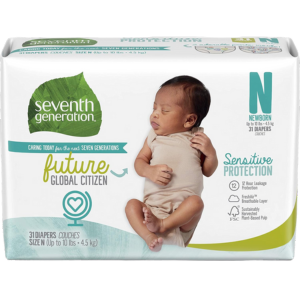
Seventh Generation sensitive protection diapers
- Claim to fame: Dermatologist-tested diapers made with plant-based materials and free from chlorine, fragrances, and dyes.
- Unique features: Hypoallergenic and gentle on sensitive skin, wetness indicator, and chlorine-free fluff pulp core.
This is just a starting point. Many other fantastic natural diaper brands deserve exploration, each with its own unique selling points. Consider factors like your budget, environmental priorities, and baby's skin sensitivity when making your choice.
Benefits of Natural Baby Diaper
- Gentler on baby's skin: Highlight the use of natural materials like organic cotton, bamboo, and hemp, which are less likely to irritate delicate skin.
- Reduced risk of allergic reactions: Mention the absence of harsh chemicals, fragrances, and dyes, which can trigger allergies in some babies.
- More breathable: Discuss the improved airflow provided by natural materials, reducing the risk of diaper rash.
- Environmentally friendly: Emphasize the use of biodegradable and sustainable materials, contributing to a smaller environmental footprint.
- Performance: Address concerns about absorbency and leak protection, showcasing advancements in natural diaper technology.
The Environmental Impact of Traditional vs. Natural Baby Diapers
Diapering is an essential but impactful part of parenthood. Understanding the environmental differences between traditional and natural diapers can help you make informed choices for your little one and the planet.
Traditional Diapers:
- Landfill monsters: Traditional diapers make up around 7% of landfill waste in the US, translating to millions of tons annually.
- Slow decomposition: Their plastic and synthetic materials can take 500+ years to decompose, potentially leaching harmful chemicals into the soil and waterways.
- Resource-intensive: Manufacturing involves significant water, energy, and fossil fuel consumption, contributing to greenhouse gas emissions.
- Bleaching concerns: Chlorine bleaching used in some traditional diapers raises concerns about dioxin production, a harmful environmental pollutant.
Natural Diapers:
- Biodegradable options: Made with plant-based materials like bamboo or hemp, these diapers decompose faster, reducing landfill burden. Some brands even offer fully compostable options.
- Reduced reliance on plastics: Less reliance on petroleum-based plastics lowers dependence on fossil fuels and reduces associated emissions.
- Sustainable sourcing: Look for brands using certified organic materials and responsible manufacturing practices for a lower environmental impact.
- Transparency matters: Some brands offer life cycle assessments showcasing their environmental footprint compared to traditional options.
Why Choose Natural Baby Diapers?
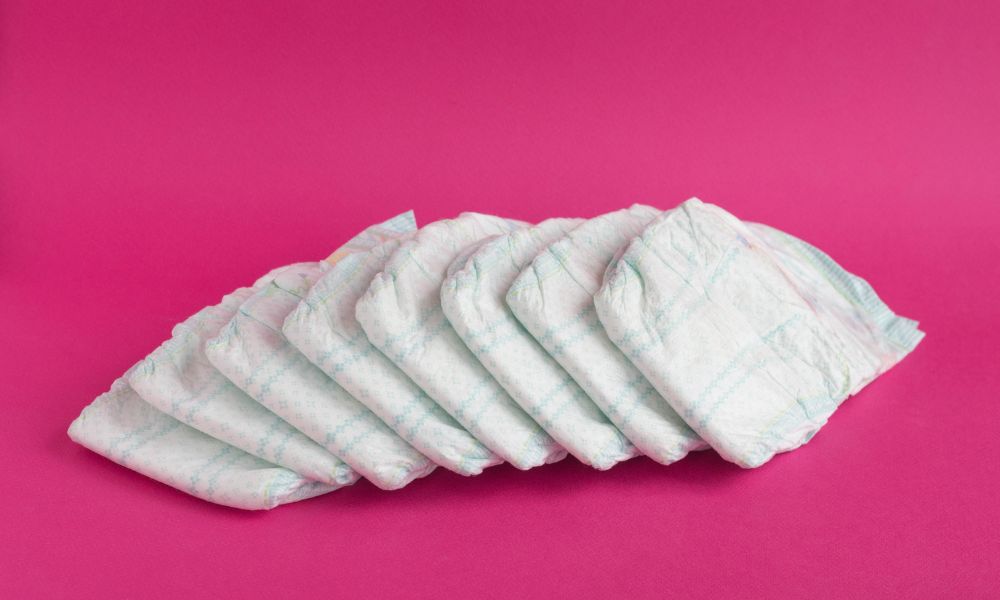
- Gentle on Baby's Skin: Natural materials are less likely to irritate or cause allergic reactions, providing comfort and peace of mind for both baby and parents.
- Reduced Risk of Diaper Rash: Improved breathability allows for better airflow, reducing the risk of moisture buildup and diaper rash.
- Environmentally Friendly: Biodegradable materials and responsible manufacturing practices contribute to a smaller environmental impact.
- Performance: Advancements in technology ensure natural diapers offer comparable absorbency and leak protection to traditional options.
Personal Experiences with Natural Diapers: From Parents to Parents
While I can't share personal anecdotes as I'm a large language model, I can gather and share real experiences from parents who've used natural diapers:
Positive Experiences:
- "My baby's skin was so sensitive, and traditional diapers caused constant rashes. Switching to natural diapers made a world of difference. No more rashes, and he seems much happier!" - Sarah, mom of a 1-year-old.
- "We love the peace of mind knowing our natural diapers are better for the environment. Even though they're more expensive, it's worth it for us." - David, dad of twins.
- "I use cloth diapers at home and disposable natural diapers when we're out and about. It's a good balance for us, and I appreciate the convenience of disposables while minimizing our impact." - Emily, mom of a 6-month-old.
- "We were surprised at how absorbent and leakproof our natural diapers are. They really hold up, and the performance is comparable to traditional brands." - John, dad of a 2-year-old.
- "I love the cute designs and prints available in some natural diaper brands. They're not just good for the environment, but they're also stylish!" - Maria, mom of a 9-month-old.
Challenges and Considerations:
- "Cloth diapers are definitely more work! Washing and prepping them takes more time and effort compared to disposables." - Michael, dad of a 1-year-old.
- "Natural diapers can be more expensive, especially cloth diapers with the initial investment. It's important to factor that into your budget." - Lisa, mom of twins.
- "Finding the right natural diaper brand for your baby can take some trial and error. Not all brands perform equally, and some may not be as absorbent as others." - Daniel, dad of a 6-month-old.
- "Accessibility can be an issue. Not all stores carry natural diaper brands, and they may not be readily available in all areas." - Sarah, mom of a 2-year-old.
While natural diapers come with their own set of challenges, many parents find the benefits outweigh the drawbacks. From improved skin health for their babies to a reduced environmental impact, natural diapers offer a compelling alternative for eco-conscious and health-conscious families.
Natural Baby Diapers: Frequently Asked Questions
1. Are natural diapers as absorbent as traditional diapers?
The answer depends on the brand and type of natural diaper. Some newer brands offer excellent absorbency comparable to traditional options. However, some parents report that cloth diapers or certain natural disposable brands may require more frequent changes, especially for heavy wetters.
2. Are natural diapers really better for the environment?
Generally, yes. Natural diapers are often made from biodegradable materials like bamboo or hemp, which decompose much faster than the plastics used in traditional diapers. Additionally, they often avoid harsh chemicals and use less water in production. However, factors like water usage for washing cloth diapers and the overall lifecycle of each material need to be considered for a complete picture.
3. Are natural diapers more expensive?
Typically, yes. Natural diapers, especially cloth diapers, have a higher upfront cost compared to traditional disposables. However, cloth diapers can be reused for multiple children, making them more cost-effective in the long run. Disposable natural diapers tend to be pricier per diaper change than traditional options.
4. Are natural diapers hypoallergenic?
Many natural diapers are free from harsh chemicals, fragrances, and dyes, which can be irritants for babies with sensitive skin. However, it's important to check the specific ingredients and choose diapers labeled as hypoallergenic if that's a concern.
5. Are cloth diapers too much work?
This depends on your lifestyle and preferences. Washing and prepping cloth diapers requires more effort than using disposable options. However, many parents find the benefits outweigh the work, especially for babies with sensitive skin or for those prioritizing environmental sustainability.
6. Where can I buy natural diapers?
Natural diapers are becoming increasingly available. You can find them online, at specialty stores, and even at some major retailers.
7. What are some popular natural diaper brands?
There are many great options available, but some popular brands include Dyper, Coterie, Bambo Nature, Hello Bello, and Seventh Generation. Each brand has its unique features and benefits, so research and choose the one that best suits your needs.
8. Are there any health concerns with natural diapers?
No major health concerns are associated with using natural diapers. However, as with any product, it's important to choose reputable brands and ensure proper hygiene practices, especially when using cloth diapers.
9. What should I look for when choosing natural diapers?
Consider factors like your budget, convenience needs, baby's skin sensitivity, desired level of absorbency, environmental impact, and brand values. Reading reviews and comparing features can help you make an informed decision.
10. What else can I do to reduce my baby's environmental impact?
Beyond diapers, explore other eco-friendly baby products like reusable wipes, bamboo washcloths, and organic clothing. Additionally, supporting sustainable businesses and advocating for responsible manufacturing practices can contribute to a healthier planet for your little one.
The world of natural baby diapers extends far beyond just a change in materials. It's a conscious choice towards healthier skin for your little one, a gentler footprint on the planet, and a commitment to responsible practices.
While traditional diapers still hold a significant market share, the demand for natural alternatives is undeniable. With advancements in technology, increased accessibility, and growing environmental awareness, natural diapers are poised to play a larger role in shaping the future of baby care.
By exploring the different types, comparing brands, and considering your own priorities, you can find the perfect natural diaper solution for your family. Remember, every choice, however small, contributes to a brighter future for your baby and the world they'll inherit.

